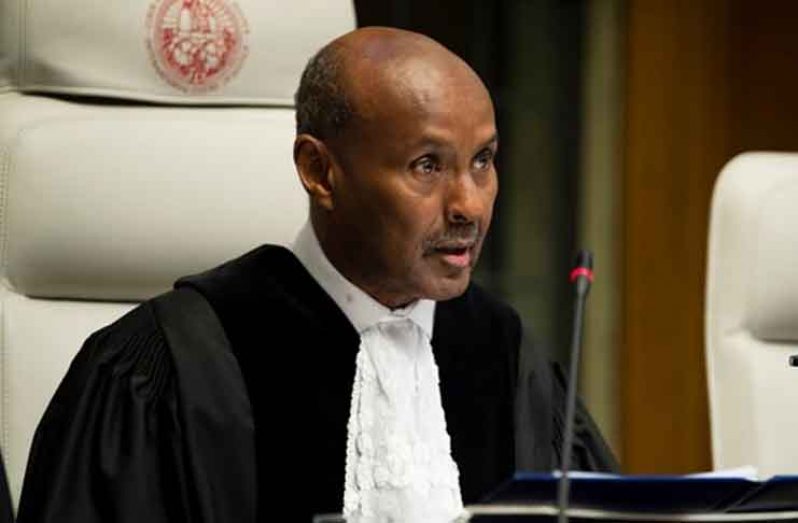THE International Court of Justice (ICJ) said the written pleadings in the case concerning the Arbitral Award of 3 October 1899 between Guyana and Venezuela must first address the question of the jurisdiction of the Court and fixed the time-limits for the filing of these pleadings.
In a release the court said by an order dated 19 June 2018, it fixed 19 November 2018 and 18 April 2019 as the respective time-limits for the filing of a Memorial by the Co-operative Republic of Guyana and a Counter-Memorial by the Bolivarian Republic of Venezuela. Venezuela had indicated that it will not participate in the court’s proceedings.
In its release the ICJ said:” the Court issued this decision following a meeting held, pursuant to Article 31 of the Rules of Court, by its President, Judge Abdulqawi Ahmed Yusuf, with representatives of the Parties, on 18 June 2018. At this meeting, Mr. Carl B. Greenidge, the Agent of Guyana, indicated that his Government wished to have at its disposal a period of nine months for the preparation of its Memorial,” the ICJ release stated.
It added that Ms. Delcy Rodríguez Gómez, Vice-President of Venezuela, stated that her Government “considered that the Court manifestly lacked jurisdiction and that it had decided not to take part in the proceedings”. She handed to the President of the Court a letter, dated 18 June 2018, from Mr. Nicolás Maduro Moros, President of Venezuela, in which he pointed out, in particular, that “there [was] no basis for the jurisdiction of the Court” and that Venezuela “[would] not participate in the proceedings”.
In response to the statement of the Vice-President of Venezuela, the representatives of Guyana reiterated that their Government wished to proceed with the case. In its order, the Court pointed out that, in the circumstances of the case, it must first resolve the question of its jurisdiction and that “this question should accordingly be separately determined before any proceedings on the merits”. The Order notes that “the possibility for Venezuela of availing itself of its procedural rights as a party to the case is preserved”. The subsequent procedure has been reserved for further decision.
Back in March when Venezuela indicated that it will not participate in the case the Guyana Government made it clear that it intends to proceed with the case, noting that under Article 53 of the Statute of the Court, “whenever one of the parties does not appear before the Court, or fails to defend its case, the other Party may call upon the Court to decide in favour of its claim.”
The Ministry of Foreign Affairs, in a statement had said: “Guyana is fully committed to the rule of law in international relations, including the peaceful resolution of disputes in conformity with international law. It trusts that the International Court of Justice, the judicial organ of the United Nations, will resolve the controversy with Venezuela in accordance with the law in a manner that is fair and equitable. It hopes that, in due course, Venezuela will reconsider its position and decide to appear in Court and defend its case. The Court’s rules allow for that.”
At the same time, Guyana said that if Venezuela persists in its refusal to participate in the matter, the rules provide for the Court to proceed, after a full hearing of the case, to a final judgment that is legally binding on both the participating and nonparticipating parties. “The Ministry of Foreign Affairs wishes to reiterate that Guyana fully respects the decision of the Secretary-General of the United Nations to choose the International Court of Justice as the means of settlement of the controversy and is confident that the Court is fully empowered to decide the case,” the Foreign Ministry statement read.
Guyana had filed an application with the ICJ on March 29, 2018, requesting the Court to confirm the legal validity and binding effect of the 1899 Arbitral Award regarding the boundary between Guyana and Venezuela. As such, the ICJ invited representatives of both Guyana and Venezuela to meet at the ICJ in The Hague, seat of government of the Netherlands, to fix schedules for written pleadings.
In its Application, Guyana requests the Court “to confirm the legal validity and binding effect of the Award Regarding the Boundary between the Colony of British Guiana and the United States of Venezuela, of 3 October 1899 (hereinafter the ‘1899 Award’).”
Guyana is contending that the 1899 Award was “a full, perfect, and final settlement” of all questions relating to determining the boundary line between the colony of British Guiana and Venezuela. It is also Guyana’s position that, between November 1900 and June 1904, a joint Anglo-Venezuelan Boundary Commission “identified, demarcated and permanently fixed the boundary established by the… Award” before the signing of a Joint Declaration by the Commissioners on 10 January 1905 (referred to by Guyana as the “1905 Agreement”).
Guyana is further contending that in 1962, for the first time, Venezuela contested the Award as “arbitrary” and “null and void”.
This, according to the Applicant, led to the signing of the Agreement to resolve the controversy between Venezuela and the United Kingdom of Great Britain and Northern Ireland over the frontier between Venezuela and British Guiana at Geneva on 17 February 1966 (the Geneva Agreement), which “provided for recourse to a series of dispute settlement mechanisms to finally resolve the controversy”.
Additionally, Guyana submits that the Geneva Agreement authorised the United Nations Secretary-General to decide which appropriate dispute resolution mechanism to adopt for the peaceful settlement of the dispute, in accordance with Article 33 of the United Nations Charter.



.jpg)











